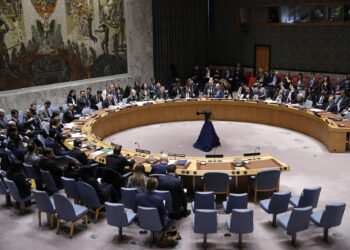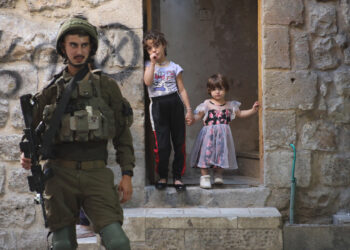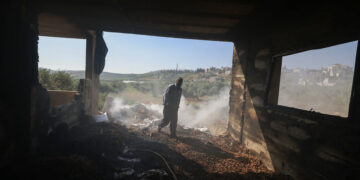Kawkab al-Thaibani is a women’s rights and peace activist in Yemen, and the founder of the She4Society Initiative, which aims to achieve sustainable peace and gender equality in Yemen from a local and feminist perspective.
Editor's note: This article is adapted from a paper presented at the Yemen D.C. Conference, which was convened in Washington by DAWN, the Tawakkol Karman Foundation and the Center for Contemporary Arab Studies at Georgetown University.
Civil society in Yemen, and women-led organizations in particular, have long been a positive force working to defuse conflict and redress grievances in the country. After 2015, they faced a new reality in which civil space shrank by the day amid all-out war, as their influence was threatened by the rise to power of warring parties across Yemen.
Since the takeover of Sana'a by the Houthi armed group, backed by Iran, and the intervention of the Saudi-led coalition, Yemen has essentially been transformed into a dependent state void of its own sovereignty or jurisdiction. The Saudi-led coalition has contributed to the weakening of the Yemeni state in two main ways: interfering in the state's decisions and appointments, and supporting an array of non-state groups and entities, including secessionist militias in southern Yemen. This seems to contradict the coalition's main goal of "restoring the legitimacy" of the Yemeni government that was driven out of Sana'a by the Houthis.
On the contrary, armed non-state actors on opposite sides of Yemen's war—alternatively backed by Iran, the United Arab Emirates and Saudi Arabia—are all growing increasingly stronger in Yemen, while the Yemeni state gradually shrinks and becomes dependent on these meddling outside powers. In turn, this has led to a lack of accountability in the country for abuses and human rights violations, including war crimes. This reality is the biggest challenge for civil society organizations that depend on law and order to make positive contributions to peacemaking efforts.
"We need to see women working on the ground get involved if we want peace," one local female activist in Taiz told me.
- Kawkab al-Thaibani
All warring parties in Yemen have committed human rights violations against civil society organizations and especially against women, who have faced constant threats, most of all from the Houthis. This has created an environment of fear that limits civil society's peacebuilding work and distorts any narrative of peace, as many Yemeni women fear that the Houthis will retaliate against them.
Since the war began, the Houthis have been defaming women activists and civil society organizations, labeling them as a "soft power" that serves a foreign agenda and conducts "unethical" work. The Houthis use media and social media to promote these attacks. A recent disinformation campaign over social media has tried to link Yemeni women working in civil society and peacebuilding organizations to foreign networks that want to "ruin" Yemen and pursue other ulterior motives. The Yemeni government has not taken any steps to curb such attacks or punish the perpetrators.
The lack any government response to these smears has led to normalizing the stigmatization of the work of women's rights and civil society organizations across Yemen. As a consequence, women from grassroots civil society organizations face huge difficulty addressing the gender-based grievances created by the war.
In addition to living under these difficult conditions, Yemeni women must confront the political agenda that dominates their civil space. In Houthi-controlled areas in northern Yemen, the situation is the most dire. The Houthis have established the National Authority for the Management and Coordination of Humanitarian Affairs and Disaster Recovery, which controls all activities of local or international organizations on the ground. The authority blocks all activities by independent civil society organizations, including peacebuilding projects, and only allows work by entities operating in line with the Houthi group's political agenda.
Meanwhile, the role of the Saudi-led coalition has affected the perceived impartiality and professional structure of many Yemeni civil society organizations, making their work more arduous as they try and remain neutral in the war. As a civil society leader in Jawf, north of Sana'a, told me: "If this continues, there is a danger that in the future we will not find any impartial NGOs, and those who work impartially will be attacked by all parties."
The majority of peacebuilding work in Yemen today is through Track 2 diplomacy (unofficial or "backchannel" diplomacy), rather than Track 3 (essentially people-to-people diplomacy), leaving women-led and grassroots civil society organizations largely sidelined, even though they have the most capacity to work on the ground to promote peace efforts. To make matters worse, there is an extreme lack of funding for their work. Yemeni women increasingly must volunteer in civil society and peacebuilding efforts without any financial support, just to make their voices heard.
"We need to see women working on the ground get involved if we want peace," one local female activist in Taiz told me.
As the war has fractured Yemen's state system, many regions across the country are beginning to break away from the center of power. While international and regional interventions have played a role in destabilizing Yemen, this move toward decentralization and regional self-governance can also be an opportunity for those advocating for peace.
Women and civil society organizations working at the grassroots level are accepted by local communities and enjoy their trust because they are responsive to their needs. Their agendas are driven by the priorities of the population, and they operate with the utmost neutrality, without political interference, which could be an asset in ongoing and future negotiations for peace in Yemen.
In Houthi-controlled areas, women cannot work in peacebuilding; if they do, they are liable to be imprisoned or have their organizations shut down. At times, women also risk their lives.
- Kawkab al-Thaibani
The war has fundamentally changed the structure of civil society organizations in the country, including those led by women, not only because of the political dominance of non-state actors and regional powers, but because of a donor-driven agenda that does not ensure sustainable results for the people on the ground. In contrast to the outside support provided to the warring parties, there is a lack of any such support for civil society in Yemen, including women-led organizations.
In Houthi-controlled areas, women cannot work in peacebuilding; if they do, they are liable to be imprisoned or have their organizations shut down. At times, women also risk their lives. The excruciating fear that Yemeni women experience in Houthi-controlled areas, on top of the gender-based stigma imposed on them by the Houthis, make it nearly impossible for local peace organizations to operate. Unfortunately, supporting peace work by women is not a priority in the current negotiations in Yemen. Local feminist organizations are catalysts for peace, and therefore all efforts should focus on protecting them.
Yemen suffers from a staggering lack of accountability for abuses—an outcome of all the regional and international actors that are involved in the war and want to protect their own narrow interests. This is also evident from the fact that the mandate of the U.N.'s Group of Eminent Experts on Yemen, a war crimes accountability mechanism, was not renewed in 2021. More must be done to create an alternative monitoring body to promote accountability and justice in Yemen. In addition to the extreme security threats they face, local human rights organizations struggle to report on abuses and other grievances from the war. These organizations are also in urgent need of financial and technical assistance. Supporting them will have multiple impacts in Yemen, as it will support future justice efforts and promote other aspects of civil society that are important for lasting peace.
In some regions of Yemen, such as Marib, Shabwah, Mahrah and Hadhramaut—all of them outside of Houthi control—there is relative order today compared to the pre-war period—in the form of increasing infrastructure projects and the provision of services, to such an extent that these governorates have started to operate in isolation from the central Yemeni state. This could be a building block to prevent the centralization of power in Sana'a that characterized the pre-war regime of President Ali Abdullah Saleh. While it is important to deal with the regions of Yemen still mired in conflict, it is equally important to protect the more stable pillars of the country in these local governorates, to prevent Yemen from completely disintegrating. With the fragmentation of Yemen's central state, a local order has emerged that, if nurtured, could lay the foundation for peace.





































